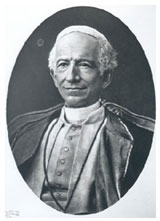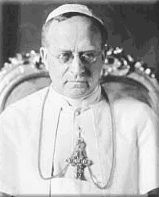
H.J.A. Sire,
Phoenix from the Ashes: The Making, Unmaking, and Restoration of Catholic Tradition
(2015), writes, on p. 146:
The history of the Holy See offers us in these years [1814 to 1963] one pope who has been canonised (Pius X), two beatified (Pius IX and John XXIII), and another (Pius XII) who would certainly have been beatified or canonised but for the ideological bias of the following period. The Middle Ages and the Tridentine period offer no such succession of exemplary Vicars of Christ.  Yet personal sanctity is not identical with the gifts that make a great ruler of the Church, and in that respect this time provides two exceptional figures. Leo XIII and Pius XI deserve to be considered not only the ablest popes of the period but two of the greatest popes in the Church's history, notable for the distinction of their teaching and in particular for the development of Catholic social theory. Their pontificates may be taken as the example of how the Church ought to be governed in the modern world and has not been governed for the past fifty years: with authority, with statesmanship, with a grasp of the needs of contemporary society, and with a firm attachment to the principles of Catholic tradition.
Yet personal sanctity is not identical with the gifts that make a great ruler of the Church, and in that respect this time provides two exceptional figures. Leo XIII and Pius XI deserve to be considered not only the ablest popes of the period but two of the greatest popes in the Church's history, notable for the distinction of their teaching and in particular for the development of Catholic social theory. Their pontificates may be taken as the example of how the Church ought to be governed in the modern world and has not been governed for the past fifty years: with authority, with statesmanship, with a grasp of the needs of contemporary society, and with a firm attachment to the principles of Catholic tradition.
 H.J.A. Sire, Phoenix from the Ashes: The Making, Unmaking, and Restoration of Catholic Tradition
H.J.A. Sire, Phoenix from the Ashes: The Making, Unmaking, and Restoration of Catholic TraditionYet personal sanctity is not identical with the gifts that make a great ruler of the Church, and in that respect this time provides two exceptional figures. Leo XIII and Pius XI deserve to be considered not only the ablest popes of the period but two of the greatest popes in the Church's history, notable for the distinction of their teaching and in particular for the development of Catholic social theory. Their pontificates may be taken as the example of how the Church ought to be governed in the modern world and has not been governed for the past fifty years: with authority, with statesmanship, with a grasp of the needs of contemporary society, and with a firm attachment to the principles of Catholic tradition.

2 comments:
I found this part of Sire's book difficult to take. He engages in several rants that really undermine the book's overall content, which is generally excellent. His rant against the internal combustion engine and private motor car just left me gasping. But I also found this discourse on the popes highly problematic.
First, we know that many of the beatifications and canonizations of recent popes have been as much politically motivated as a recognition of real sanctity. They are trying to canonize the Council, to keep it above reproach and criticism. But I think he really lost the plot when he declared Leo XIII and Pius XI generally superior to Pius X. In fact, he seems to hold good Pope Sarto in relatively low esteem. To my mind, this is an egregious error.
Sire glosses over serious questions about the pontificates of those he idealizes, especially those of Pius XI. While Quas Primas is a fantastic document and gift to the Church and world, there were a number of prudential actions on the part of Pius XI which are really difficult to accept, like his undermining of the general Catholic reaction against militant secular pagan government which was rising in the 20s and 30s. He sought an accord with liberalism, not to encourage revolt against it, as was taking place in Mexico, Spain, and elsewhere. And, I think one can take a number of issues with the concordat with Mussolini, especially in what it surrendered in terms of the pope's temporal authority. It is surprising Sire would gloss over this, given his enormous (I would say exaggerated) emphasis on the Church's temporal influence.
Tantumblogo,
Thanks for your comment. I agree it's a mixed bag. My hunch is that while recognizing the piety and virtue of a pope like St. Pius X, as well as his contributions in the early battle against modernism (which he doesn't mention in this excerpt), he may have been put off by Pius' uncritical alliance with Charles Maurras'Action française, which was all too easily seen as a convenient ally against a common foe, despite its dubious atheistic roots. Even Garrigou-Lagrange shared similar sympathies.
I agree completely about the inertia of the popes in the face of the rising tide of diabolical hostility against the Church in Spain, Mexico, etc., as well as the Concordat with Mussolini.
I floated the excerpt to see what kind of reactions I'd get. I thank you for yours.
Post a Comment